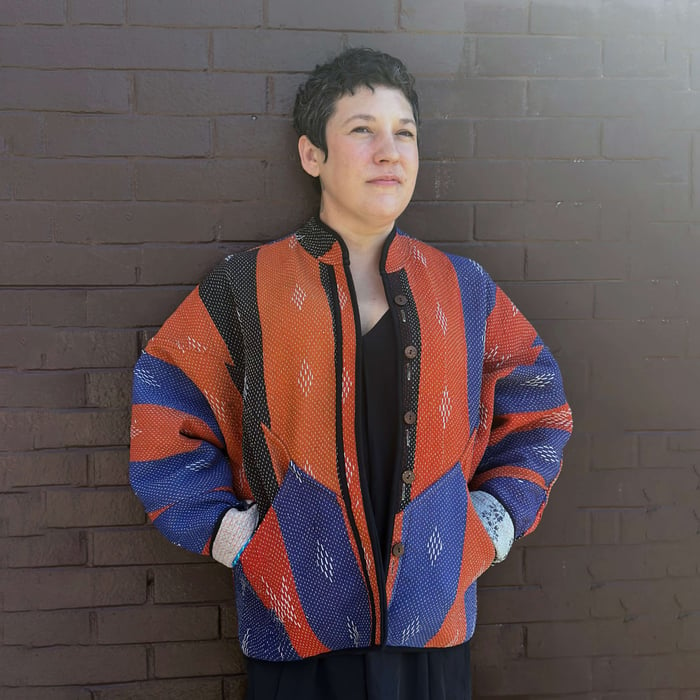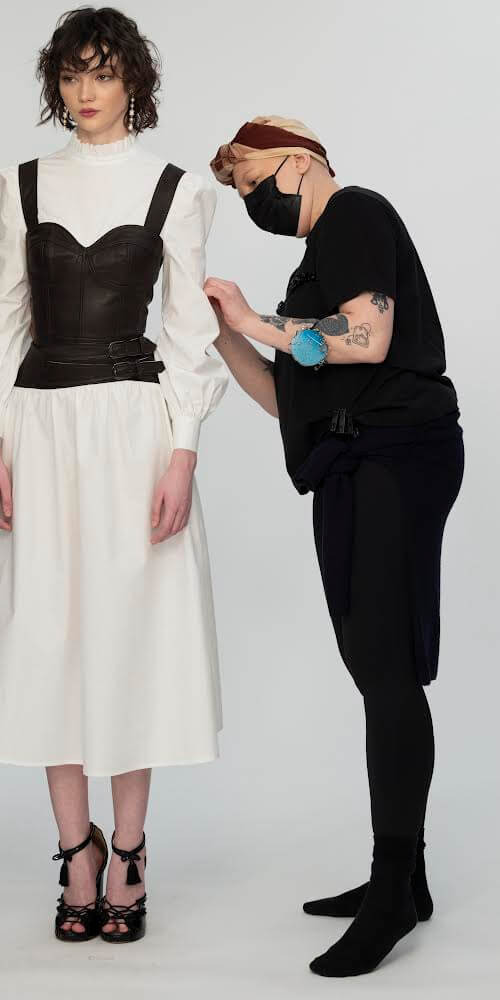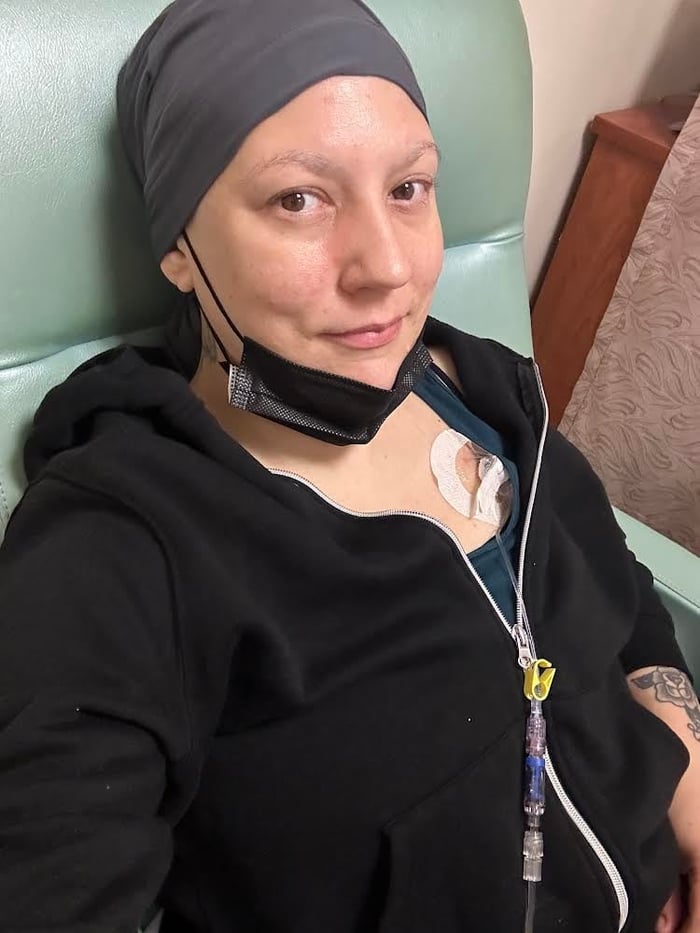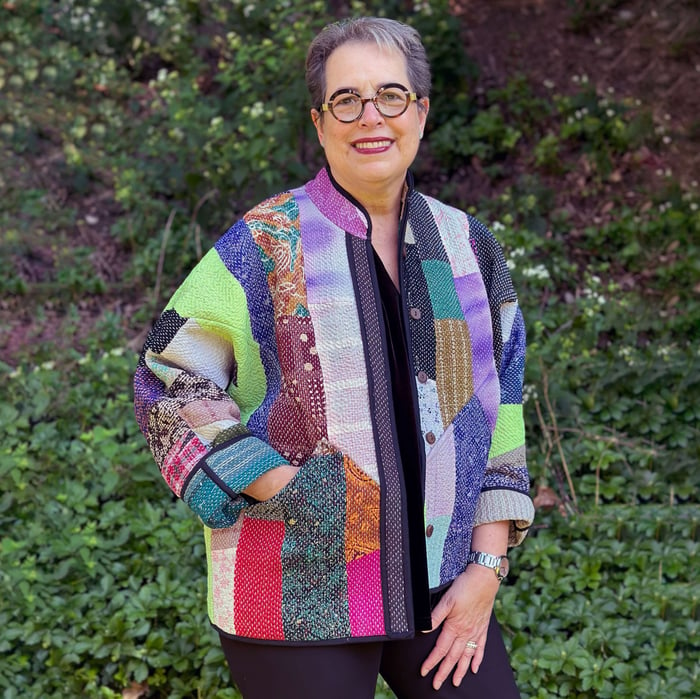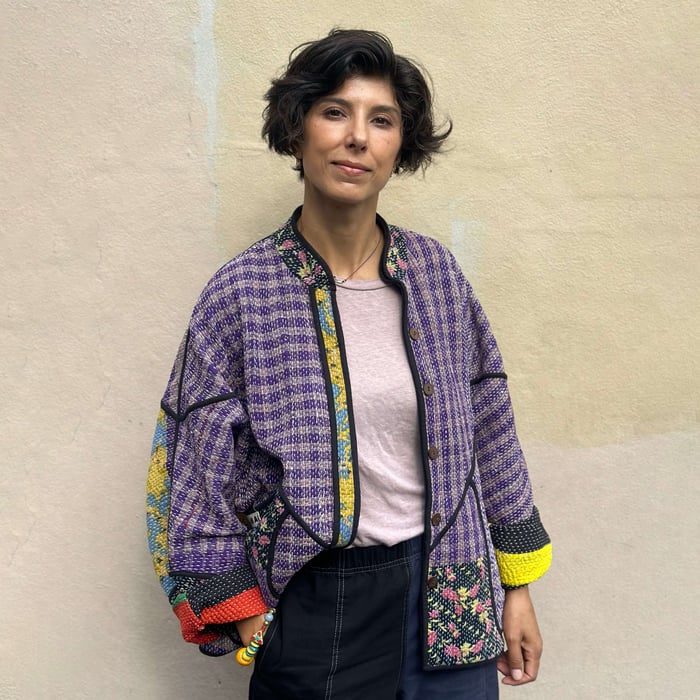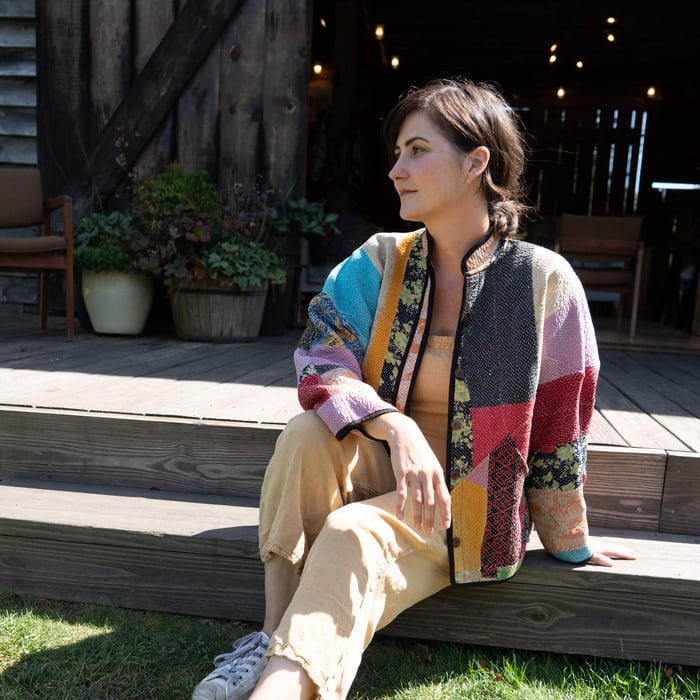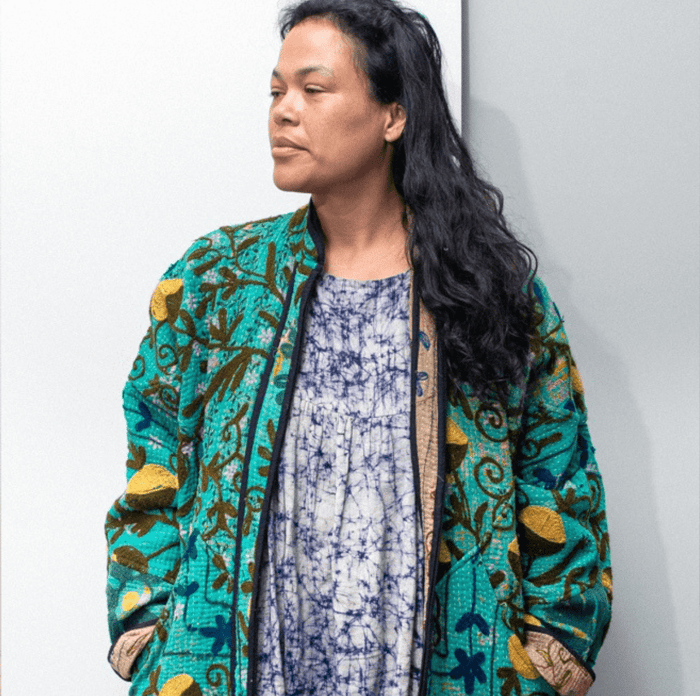Amy is a womenswear designer based in Brooklyn, NY. She was diagnosed with triple positive stage 2 breast cancer in August 2023 right after her 39th birthday. She has resided in NY for over ten years, and the past three she has been the designer for Marchesa in their daywear division called Rosa. She is currently healing, preparing for reconstructive surgery, and taking her life back post treatment.
I met Amy through a mutual photographer friend. She knew Amy was a fellow fashion designer and had just been diagnosed with breast cancer. We texted, and speaking to her made me feel less alone. The type of breast cancer that Amy has was triple positive like me, and so I felt really connected to what she was going through. When we met for the first time, it felt like we had known each other for years. Here’s her story, a deeply personal and inspiring telling.
Can you describe how your diagnosis came about?
I felt a lump on my upper right breast right near my armpit. I think I always knew something was wrong but it's one of those things you never think will happen to you. I was under forty and never had a mammogram. I had started being much more active around that time doing Pilates and even light weight training, so I honestly thought I pulled a muscle. I had the gynecologist at my annual say that it seemed like a pulled muscle. It just kept growing and started becoming painful. The whole area turned bruised at one point. I did put it off for a minute, but my body knew. I couldn’t focus. I feel really lucky my primary care doctor heard me and set me up for a mammogram with a special referral because I was under forty. They found 5 lumps including one in my lymph nodes, and I had to get all 5 biopsied. Within a week of my biopsies, I was diagnosed with triple positive stage 2 invasive ductal carcinoma in my right breast.
How did it feel for you? And how soon did you share your diagnosis with those close to you?
It all was surreal for sure. I felt like I was watching myself in a movie and was a little bit in shock that it was happening. For me, I told everyone immediately. To be completely honest I drank a bottle of wine and drunk phone called my family and close friends. I’m not proud of that but it was how I coped in the moment. I felt like I had to keep saying it out loud for me to process it. It wasn't till I met my oncologist where it hit me this was real. I remember open mouth silent screaming in the bathroom at the cancer center. No matter how much I prepared myself for what was about to happen, hearing the details from my doctor of what was to come was crushing. My whole life was about to change forever. That's a lot to process in a short amount of time.
Getting diagnosed can be such a learning curve of information, and life changing decisions that need to be made quickly. How was this for you?
I could believe how fast I had to make life altering decisions. I wasn't prepared for that. I was diagnosed and 3 weeks later was in the chemo chair. In the beginning it was so fast I didn’t have time to even seek support or resources. I had to really quickly learn to trust myself over everything. Constantly check in with myself & my body. It wasn't until I started treatment that I began to look into support. Some support also found me. It was overwhelming the amount of women in my life that had gone through this or was still going through it. It shocked me. Talking to other cancer survivors and thrivers was calming. It helped me not feel crazy and feel less alone. I found The Breasties, an app and a safe space where people going through breast cancer could talk about what they are going through. Being now post treatment, I often feel like I’m still navigating it and maybe always will.
You worked a lot of the way through treatment, even chemo. How was that? And did it change or affect your creativity?
I was so full of anxiety to stop work. I felt like so many parts of my identity were being lost. I didn't want mine as a designer to also disappear. I remember before my first treatment leaving the office not knowing if I would return. I didn't know if I could work on chemo. But I could and I did. It became an escape for me. To walk into a creative space where I wasn't a cancer patient. I had so much encouragement and support at work that I started to feel more confident. I started to become more in tune with my creative intuition and decisions. Being creative during that time was a gift for me. In the days I was able to go in, I could escape the anxiety & uncertainty of what I was going through. I could still be me.
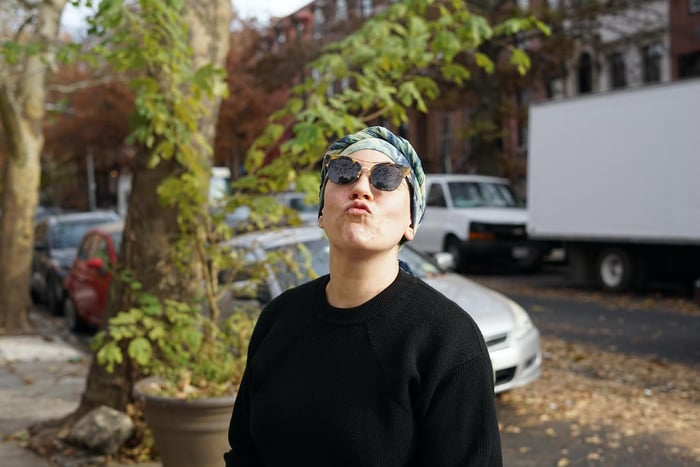 Image Caption
Image CaptionI loved hearing about your inspiration for your head scarfs when you lost your hair, can you talk about that?
I was so cool and calm about the idea of losing my hair until I lost my hair. Shaving it gave me some power back. Finally, something was my decision. I really thought about wigs and all the hairstyles I could have. Ultimately, going to get a wig felt overwhelming and with all the intense hot flashes I didn’t even want anything on my head. I worked with so many beautiful fabrics, why not wrap some on my head. Loulou de la Falaise became my head scarf muse. I started looking at images of her and vintage YSL. I would try all different ways to wrap scarves on my head. It gave me a sense of creativity in a way I hadn't felt before. It was a little like dressing up and gave me a new identity. It helped me feel put together to where I felt more confident to leave the house.
Were there ways that you connected your daily life as a designer to your diagnosis and treatment? Did you use clothing to make you feel a certain way?
Being a designer is always a part of me and it became a part of my treatment. Designing and chemo or radiation almost became intertwined. Certain collections are hard to look at because I remember how I felt designing them and others bring me joy because I overcame challenges. My body changed so much during treatment, I had to find new ways to dress my body. Depending on the stages of treatment I was in, my clothing had to adapt. I found new ways to dress and learn to embrace my new body shape.
How did documenting what was happening to you and your body connect to your life as a creative?
Documenting my treatment journey helped it feel real to me. I also wanted to show people that cancer treatment isn’t what you expect. I definitely didn’t think treatment was going to be what it was for me. I hoped my rawness would give someone else support, encouragement, or even the sense of not being alone. I wanted to show that cancer can affect anyone. I didn’t think I could have breast cancer at 38. I wanted to highlight that awareness and how important early detection is.
How/ or has community been a part of your healing process?
I have always been very independent, maybe even to a fault. In the beginning of my treatment, I was very adamant that this was my journey, and I was doing it. I never liked asking for help or leaning on anyone. Through treatment, I eventually gave into letting the people around me support me. The people that showed up...showed up. I realized I wasn't doing this alone or wanted to and people were there to support me. It was hard at first being vulnerable, but I slowly accepted it. My community was all around me from my amazing care team to my friend’s mom who had a group of women in Kentucky that would send me letters of encouragement. Community and support can come in unexpected places, and I learned to welcome it in all forms.
How has your attitude to your work changed since diagnosis and treatment?
In so many ways. My career used to be my life. Everything revolved around the fashion calendar, and I worked most of the time. I had worked really hard to get to where I was, and I finally was in a really exciting creative role. Through cancer treatment I was forced to take a step back. I was forced to put myself first above any deadline. Through this process and the amazing support of the people I work with, I realized I didn't need to work ten-twelve hour days to be good at my job. I was able to trust myself and enjoy the creative work I was doing. Even though at times it was extremely challenging, I was able to still design. Still be creative and still produce collections in the minimal time I was there. Having amazing co-workers who saw me in every state through treatment and never judged me for crying, being emotional, or needing to cut my day short was the gift of support that allowed me to still do my job as a designer. Even being back in the office now full time, I approach it differently. More mindful and trusting of my creative point of view.
I’m very cautious to not take a silver lining perspective when talking about cancer, because I think there are many ways that positive learnings can arise, not just through negative and difficult experiences. What is your feeling on this?
I agree with you about the silver lining. I will never be grateful for cancer not ever, but cancer has taught me a lot. It did make me a little sad it took cancer for me to learn these things, but we all have our journeys. Saying this always gets me emotional but I learned to really trust myself. I learned to listen to my body and what it needed. I learned to put myself first and set boundaries. This is going to sound a little funny, but I fell in love with humans again. When you acquire a deadly disease in your body you start to notice small things. It made me happy to see people happy in the most mundane daily life tasks. Maybe because my own life was so rattled that it brought me joy to see people enjoy their life. It brought so much to the surface for me on what really mattered. I don't get stressed about a lot because nothing feels as stressful or intense compared to what I just went through. When you have to make life altering decisions like weather or not to remove your breasts, everything else seems pretty easy. And Lastly, I get so excited about food. Chemo was horrific and nothing tasted good during treatment. Now I still sometimes do a silly dance from excitement when something I eat tastes delicious.
What advice would you give someone who is newly diagnosed?
You know your body best. Advocate for yourself and trust your decisions. The worst will pass even when it feels like it never will. You don't have to be strong. Lastly, try and love your body. Even if it feels strange, bigger, smaller, whatever form it must go through to keep you alive. I always say I will never say anything mean again to my body because it worked hard for me and now, I want to work hard for my body.

